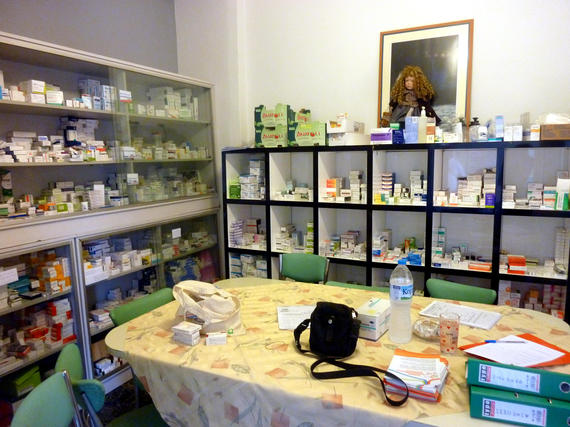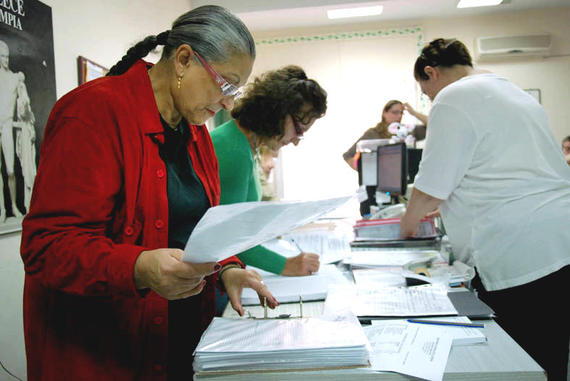
'The right to health'"It is not just money that is missing. People lost their rights," Nikos from the solidarity clinic in Peristeri told me, a neighborhood in northwest Athens. Nikos is referring to the right to health; a right that was taken away when physicians were laid off and when waiting times became unbearable. If the state does not have the finances to save its population´s health, its people will. As Nikos says "We just want back our rights. We will then fight for the budget, together".
The sheer existence of a solidarity structure makes clear that the times in which health was affordable are long over. The Metropolitan Clinic of Helleniko, by far the biggest solidarity clinic in Greece, reports patient numbers have risen by 375% from 2012 to 2013 with 15,000 patients asking for medical attention in 2013 alone and probably reaching 20,000 patients in 2015.
Meanwhile, the International Monetary Fund was reporting that all of this is part of its plan to "to keep public health expenditure at or below 6 percent of GDP, while maintaining universal access and improving the quality of care delivery." In other words, Greece suddenly needed to do more with much less. It was expected to take care of the health of 11 million people and a rising number of immigrants with only 6% of its GDP starting in 2010. This has further decreased to roughly 5% in 2015. Most other EU countries spend at least double as much on health. State-run hospitals have had to cut budgets by as much as 50%, tens of thousands of physicians and other medical staff members were laid off as part of this "modernization" of healthcare.
'Patient-centered care'In Patission, a formerly wealthy neighborhood in the northern edge of the city, I met Irene and Aleka, who both volunteer their time at the neighborhood´s Social Pharmacy which was founded by two pensioners almost three years ago. My question regarding their feelings about the future was met with head-shaking and ironic laughter. "The future? When Syriza got elected we believed the pharmacy would close, but the opposite happened, we are going backwards." They told me about their patients and the anger they sometimes share with the volunteers at the pharmacy. "People feel betrayed, cheated on and lied to. They feel so much anger". Irene, a former secretary for more than 33 years who lost her job 5 years ago and whose work as a volunteer helped her escape a depression, adds in quiet voice "Now after the news of the new memorandum, I feel I am losing my strength, my hope. I am looking for something small to grab but nothing seems to be improving."
She continued by telling about the pharmacy´s relevance and the 944 patients registered and how they have identified ca. 70 families in need of food assistance. Every couple of months those families can come to the pharmacy to pick up donated food and baby products next to the medical products they receive, helping them survive as many are unable to sustain their families since having become unemployed. Irene and Aleka do not only help organize food assistance, they are also aware of the emotional support the pharmacy provides. To my question of whether she thinks the people coming to the pharmacy come for more than just medicine, Aleka replied "Some people don´t want to be alone, they are understood here. We are all in this together."
It is exactly examples like this that demonstrate the clinic´s far bigger purpose than to simply provide health-related attention. In the process of trying to meet the basic health needs of the people in their communities, these clinics are cultivating democracy and justice, and they are planting the seeds of a more patient-centered health service, one that takes multiple social determinants of health into consideration.
'Beyond medicine'Through my visits to dozens of clinics in and around the city I came to realize that solidarity clinics can be said to fulfill three main functions: Firstly, the obvious medical function through the provision of free healthcare services to a continuously increasing number of patients at their own locations as well as through a loose network of associate clinics, diagnostic centers and physicians.
Secondly, the function of a social support system, which attempts to assist patients in matters of food and shelter and thus, considers other determinants of health than just access to health services. This function also aids in strengthening social relationships through its inviting and participatory character, it assists people with the integration into social life and gives back dignity to those that felt excluded from society due to illness, unemployment or both.
And thirdly, a political function in which solidarity clinics advocate the right to health and show resistance to all those trying to impose limits on this right. Those are not only the institutions that forced austerity on Greece in the first place but also, national and international policies limiting access to healthy living incl. privatization of water, the country´s beaches or the ongoing commodification of health and health care. Having said this, solidarity clinics as part of Greece´s newly emerged solidarity economy go beyond achieving purely social aims: they aim to put right an injustice by expressing solidarity.
'Being part of something'They are in the first place about providing medical help, but whoever spends a couple of hours within their facilities, will soon come to realize that their actual relevance encompasses a much wider field and probably an even more important one- companionship in times of crisis.
So regardless of what the near future holds, for the next year or two many of the clinics will continue to be there when no one else is. They will offer a new, innovative form of providing medical attention to people without the use of money and authoritarian principles. "No one will be left alone during the crisis", is therefore a sentence that now marks the websites and leaflets of multiple solidarity clinics and that captures well how the volunteers at the clinics are assisting their fellow people not only in the fight against an illness, but also in the fight against a system that limits their access to good health.
Making their patients "part of something" as Maria Spiliotopoulou - a historian and admin volunteer from the Social Clinic & Pharmacy in Omonia - told me is therefore the essential difference that distinguishes solidarity clinics from other initiatives present such as Doctors of the World. Whereas the latter without a doubt offers great service to the Greek people too, it represents a hierarchical service, where outsiders have come to help the poor and sick. Solidarity clinics in contrast believe in the actual meaning of the word; as Eduardo Galeano said "charity is vertical as it goes from the top to the bottom, while solidarity is horizontal as it respects the other person".
Those who treat and those who get treated have both been hit by the crisis, they understand each other's pain. This way, solidarity clinics do not only provide remedy to physical pain, but they give hope. They make all those visible that have felt invisible the past months and years, they offer social inclusion, companionship and love for the fellow man. Medicine is often just a practical side-effect.


